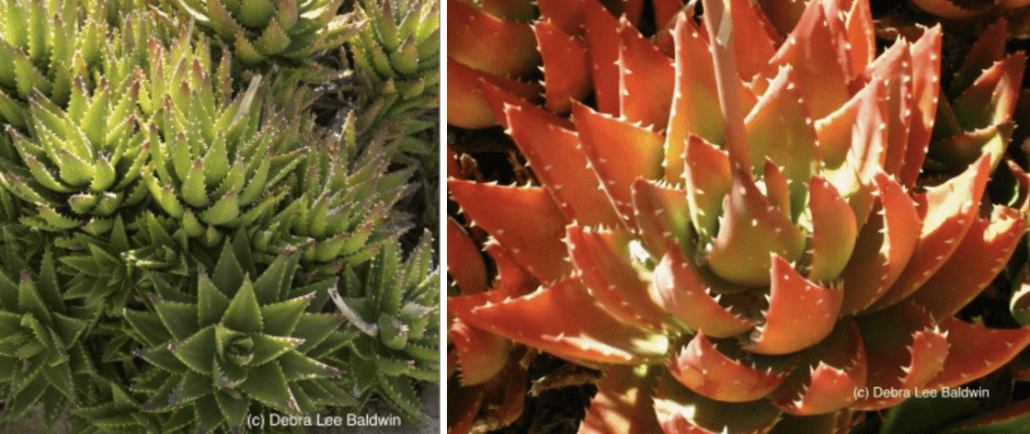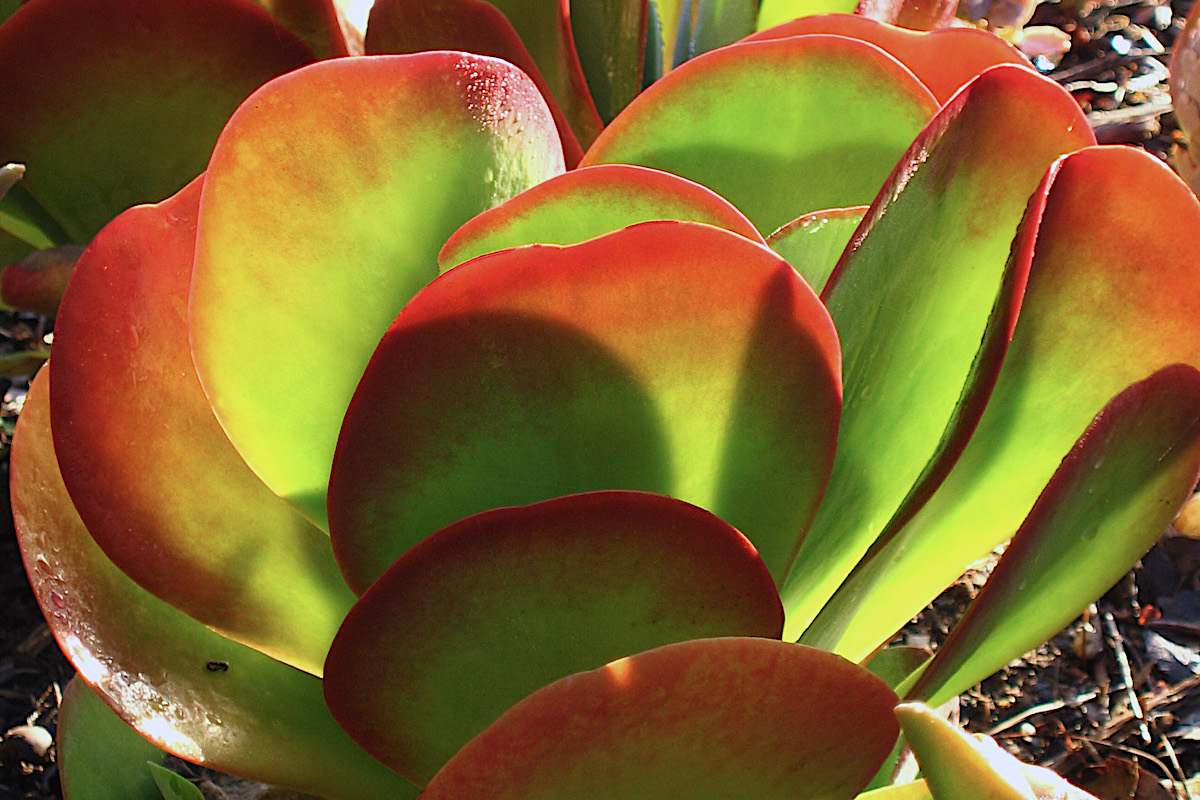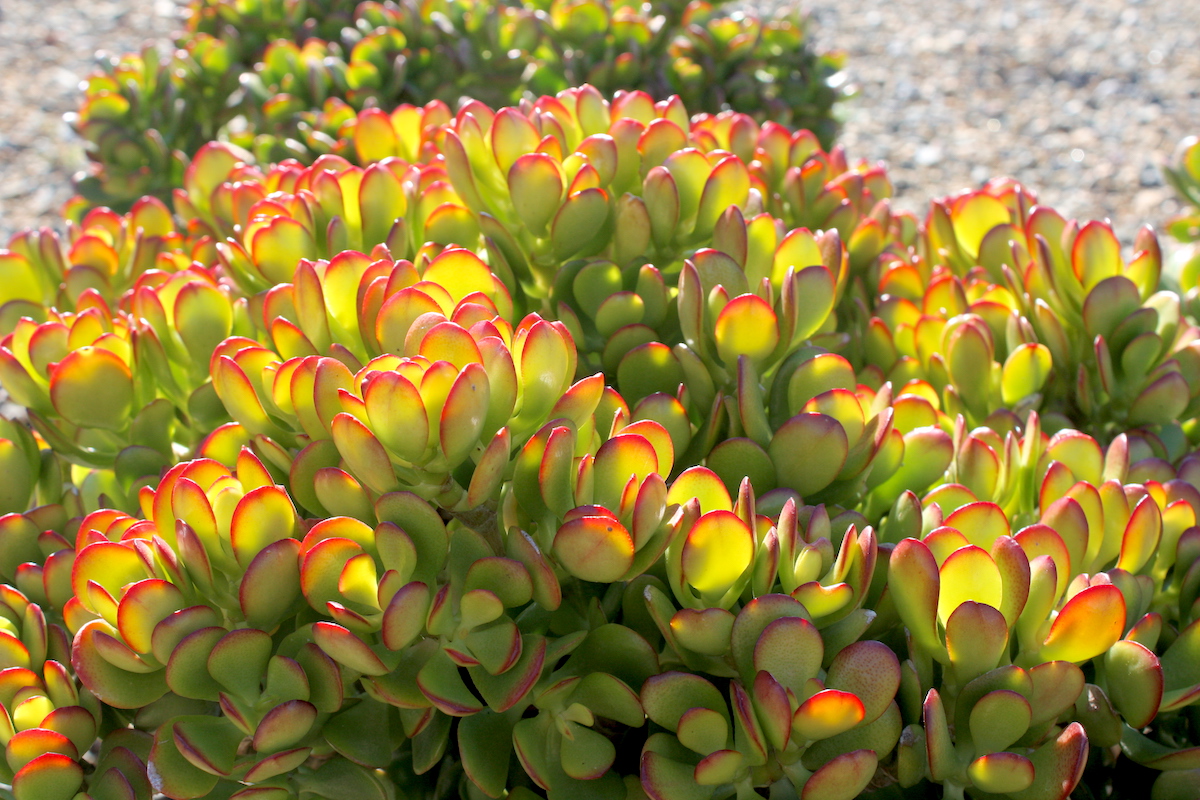Plenty of sun brings out brilliant reds and yellows in certain succulents, but how much to "stress" the plants varies depending on where you live, the time of year, and the kind of plant.
Give aloes and crassulas a bit more heat, sun or cold and less water and richer soil than they really want, and they'll turn brilliant shades of orange, red and yellow. This doesn't harm the plants, which I deem "well-stressed" when they show the brilliant colors they're capable of. A case in point is Aloe nobilis, which in my garden grows in nutrient-poor decomposed granite with minimal water.

Aloe nobilis. Left: winter (cool temps, bright shade). Right: summer (full, hot sun).
In winter, the same plant reverts to green.
Such "stressed" succulents---which survive on moisture in their leaves---are fine. They perk up and send out new growth when the weather cools and the rains return.

Kalanchoe luciae (paddle plant)
Not all succulents turn shades of red, pink or orange when stressed, in fact, the majority don't. But many common aloes and crassulas do, plus certain kalanchoes, euphorbias, sempervivums, sedums, aeoniums and echeverias. Agaves normally don't; the one above is an exception. The reason is that it's post-bloom and dying, which has revealed the anthocyanin in its tissues.
It's all about anthocyanin
In the same way deciduous trees turn color in autumn, sunset hues become visible. The pigment also is found in berries and fruits---and is considered a powerful antioxidant. Anthocyanins, according to Wikipedia, "are not synthesized until the plant has begun breaking down chlorophyll, it is presumed for photoprotection..." i.e. protection from excess sunlight, much the same way melanin tans skin. Wikipedia also wisely states that "plants with abnormally high anthocyanin quantities are popular as ornamental plants."
How to Stress Your Succulents
After seeing my YouTube video, "How to Stress Your Succulents...and Why You Should," a non-gardening friend observed, "I'd probably stress them so much, they'd croak." Good point. How do you give a succulent the right amount of stress, but not too much? And how do you know which are worth stressing, and which aren't?
Basically, observe the plant. If it's leaves are margined or tipped in red, it's a likely prospect. But if excess heat, sun or cold makes its tips shrivel and turn beigey-gray, it's suffering. Move it to a kinder location, keep the soil moist (but not soggy), and/or repot it. Also check its roots. The problem may be that roots can't access moisture and nutrients, as in the case of a cutting that's sitting atop the soil instead of snugly planted.

Crassula ovata (jade plant) stressed
This specimen of Crassula ovata is beautifully stressed (how's that for an oxymoron?). Its leaves have reddened due to less water than the plant would like plus more cold than jade prefers (frost will turn the leaves to mush, but temperatures near but above freezing reddens them).
Most succulents---especially those with fat, fleshy leaves---can last weeks and sometimes months without water, even in hot sun, nipped by frost, and/or rooted solely in gravel. But eventually they need a respite, lest stress turn life-threatening.
Gallery: Common succulents that redden when stressed
Related Info on this Site:
Learn more in my book, Succulents Simplified: "The Well-Stressed Succulent," pp. 54-55.
Also on my YouTube channel:
The post Are Your Succulents Well Stressed? See 50 Before-and-Afters appeared first on Debra Lee Baldwin. Copyright © Debra Lee Baldwin.
from Debra Lee Baldwin https://ift.tt/xy41nRv
via IFTTT


No hay comentarios:
Publicar un comentario